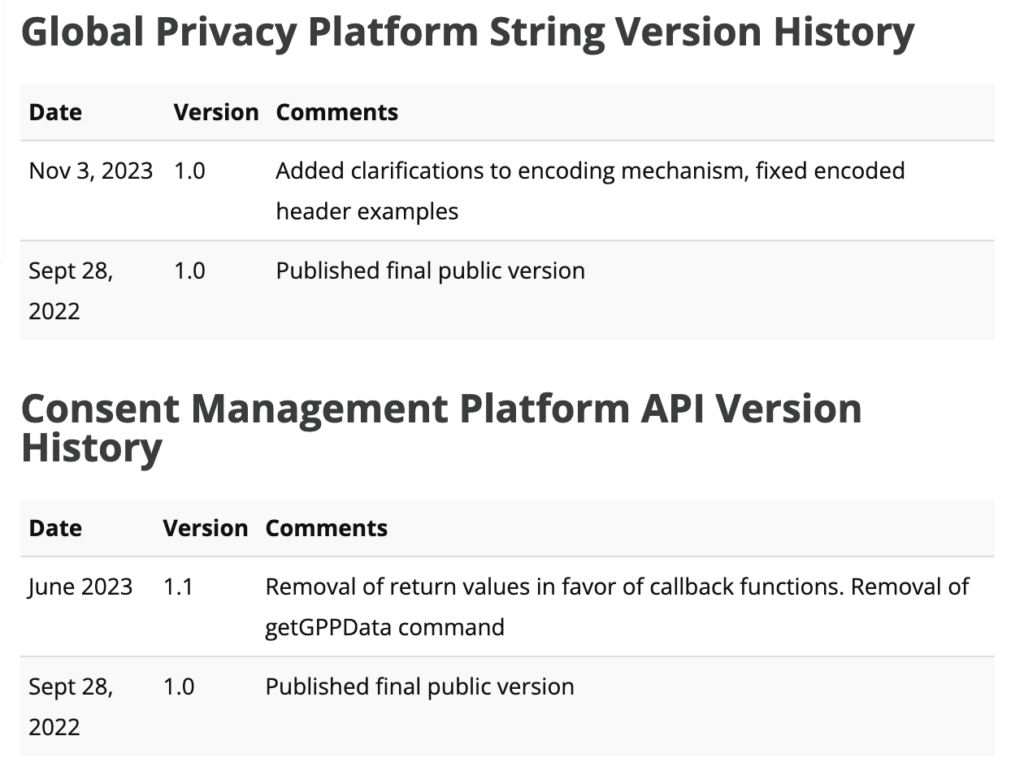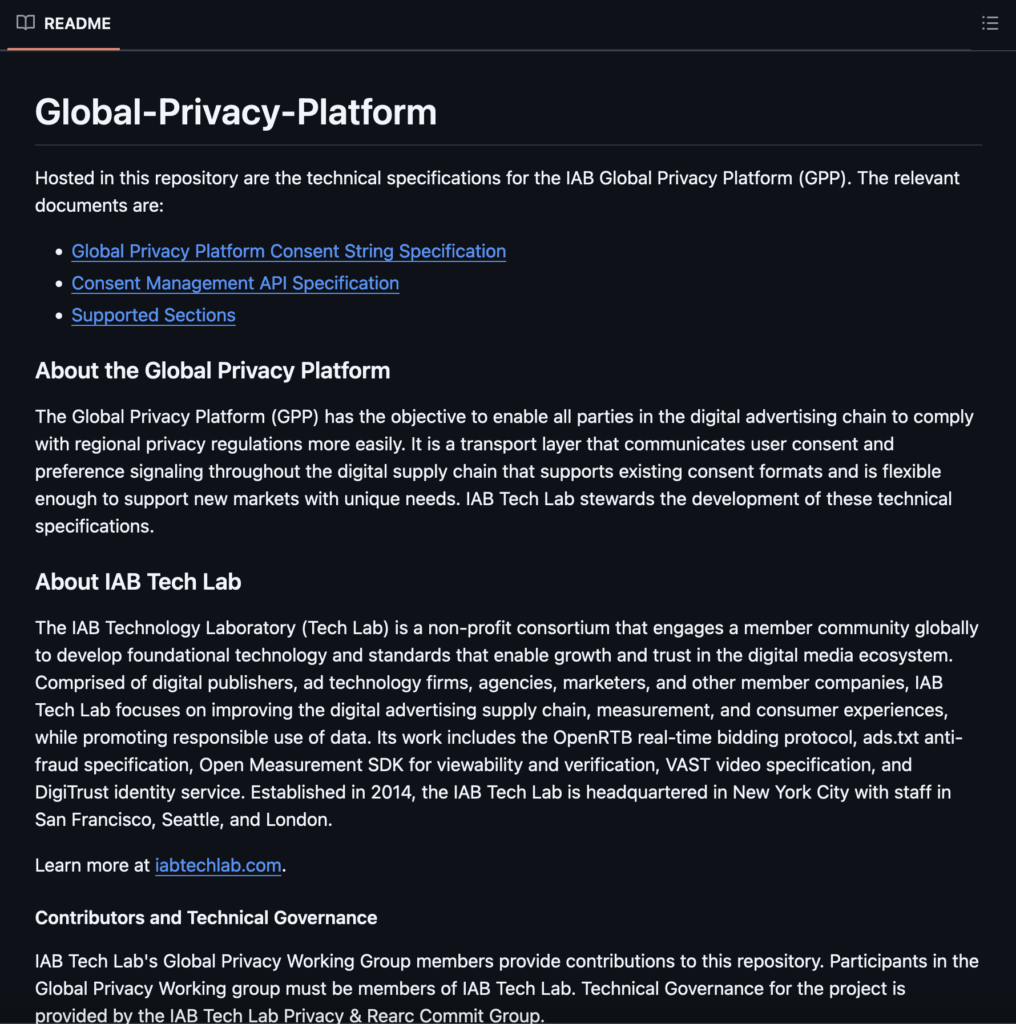Learn About the IAB’s Global Privacy Platform
As global privacy regulations evolve and expand, businesses must navigate a complex landscape of compliance. For Chief Privacy Officers and compliance teams, ensuring adherence to region-specific privacy laws—such as the General Data Protection Regulation (GDPR), California Consumer Privacy Act (CCPA), and Canada’s PIPEDA—can be overwhelming. In response to these challenges, the Interactive Advertising Bureau (IAB) developed the Global Privacy Platform (GPP), a comprehensive privacy framework that simplifies multi-jurisdictional compliance management.
The GPP offers a unified technical standard for expressing user preferences across regions, reducing the friction involved in complying with multiple privacy laws simultaneously. It ensures consistency in how companies collect, store, and share consent signals, helping businesses remain compliant with data privacy regulations worldwide. For privacy officers, the GPP streamlines the burden of meeting divergent legal requirements, offering both scalability and interoperability across jurisdictions.

What Is the Global Privacy Platform (GPP)?
The Global Privacy Platform (GPP) is an initiative from IAB to create a global framework for privacy signals, aimed at enabling businesses to harmonize their consent management practices. It is a technical standard that allows companies to send, receive, and interpret privacy-related data, including consent preferences, opt-outs, and legal bases for data processing.
One of GPP’s primary goals is to ensure interoperability across global frameworks, including the IAB Transparency and Consent Framework (TCF) and regional privacy rules like CPRA, PIPEDA, Virginia’s VCDPA, and others. The platform automates the transfer of consent signals between advertisers, publishers, and vendors, eliminating the need for businesses to develop separate workflows for each region.
The GPP simplifies privacy compliance by focusing on several core components:
- Global User Privacy String (GUP): Encodes user preferences and permissions across regions.
- Interoperability Modules: Extends support for different privacy regulations.
- API Integrations: Provides programmatic access to privacy preferences for vendors, publishers, and advertisers.
GitHub Global Privacy Policy
A 2023 whitepaper by the IAB Tech Lab outlines how early adopters of GPP have been able to reduce compliance overhead by 40% while achieving higher accuracy in tracking consent preferences. This research highlights the value of standardization in privacy management for reducing legal risks.

Key Benefits of the Global Privacy Platform (GPP)
- Simplified Multi-Jurisdictional Compliance: GPP enables CPOs to manage diverse privacy regulations using a unified framework.
- Interoperability with Existing Frameworks: Supports alignment with IAB’s TCF and emerging privacy laws.
- Real-Time Consent Management: Automates the exchange of consent signals to ensure continuous compliance.
- Scalability for Global Operations: The framework is designed to support privacy needs across multiple regions, with the flexibility to adapt as new regulations arise.
- Risk Mitigation: Reduces the likelihood of non-compliance by maintaining accurate, automated consent signals.
Challenges in Implementing GPP
Despite its benefits, privacy leads and teams must be aware of the following challenges associated with adopting the Global Privacy Platform:
- Integration Complexity: GPP requires businesses to align their existing technology stacks with new API-based consent management systems.
- Training and Change Management: Privacy teams may need additional training to understand and implement the technical aspects of GPP.
- Vendor Coordination: Since the platform requires data sharing between multiple parties, organizations must ensure that third-party vendors comply with GPP standards.
- Regulatory Variability: While GPP offers a unified framework, some jurisdictions may introduce new privacy rules not yet covered by the platform.
Best Practices for CPOs to Implement GPP Successfully
- Conduct a Privacy Audit: Assess your organization’s current privacy practices and identify areas that require alignment with GPP.
- Partner with Consent Management Platforms (CMPs): Work with CMP vendors that support GPP to ensure seamless integration or ones that implement and validate via the IAB TCF’s validation tool.
- Monitor Vendor Compliance: Establish monitoring processes to ensure third-party vendors adhere to GPP standards.
- Train Staff on New Processes: Provide training to relevant stakeholders to understand GPP’s technical framework and compliance requirements.
- Continuously Update Frameworks: Stay updated on emerging regulations and ensure your GPP implementation reflects the latest legal requirements.
Key Components of GPP
- Global User Privacy String (GUP): This string encodes user preferences into a standardized format that can be shared across vendors and platforms.
- Interoperability Modules: Designed to support region-specific privacy frameworks, ensuring that the GPP remains adaptable as privacy regulations evolve.
- Consent and Opt-Out Signals: GPP automates the management of consent preferences, including the ability to opt-out from data collection for specific purposes.
- API-Driven Integrations: The platform relies on API connections to facilitate seamless data exchange between advertisers, publishers, and other ecosystem participants.
Impact of GPP on the Digital Advertising Ecosystem
GPP’s introduction is transforming how businesses in the digital advertising ecosystem manage privacy compliance. With automated consent management and real-time signal transmission, advertisers can ensure that targeted ads are delivered only to users who have granted the necessary permissions. Publishers benefit by having consistent data-sharing protocols, improving transparency and trust among users.
IAB offers privacy leads the ability to manage complex compliance workflows with minimal manual intervention, freeing up resources to focus on strategic privacy initiatives.
Advantages of GPP for Privacy Teams
- Regulatory Adaptability: Aligns with existing and emerging privacy regulations, reducing the need for multiple frameworks.
- Automation of Consent Signals: Ensures that user preferences are updated and transmitted in real-time.
- Reduction in Legal Risks: Mitigates the risk of penalties by maintaining compliance with global privacy standards.
- Improved Vendor Management: Enhances visibility into third-party data processing activities.
- Increased Operational Efficiency: Reduces the need for manual compliance monitoring.
Global Privacy Platform Implementation
- Establish Clear Compliance Goals: Define your organization’s privacy objectives before implementing GPP.
- Choose a Compatible CMP: Select a Consent Management Platform that fully supports GPP standards and interoperability.
- Develop Vendor Agreements: Ensure that third-party vendors comply with GPP protocols through detailed contracts.
- Monitor Data Flows Continuously: Use real-time dashboards to track consent signals and data processing activities.
- Evaluate and Iterate: Regularly assess the effectiveness of GPP implementation and refine processes as needed.
Why The Global Privacy Platform is a Game Changer
The Global Privacy Platform (GPP) by IAB is a game-changer for organizations grappling with privacy management across multiple jurisdictions. For CPOs, it offers a scalable and interoperable solution that simplifies compliance while maintaining real-time visibility over data flows. As privacy laws continue to evolve, the importance of a global, standardized framework like GPP will only increase. Early adopters of GPP are well-positioned to reduce legal risks, improve operational efficiency, and build trust with their users through transparent and consistent privacy practices.
By leveraging GPP, CPOs can focus on strategic privacy initiatives, knowing that their multi-jurisdictional compliance needs are met through a robust and reliable framework that is well respected in the data privacy world.
For more information visit the IAB Tech Lab Website.